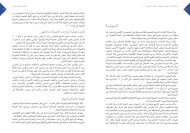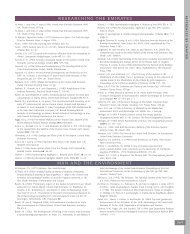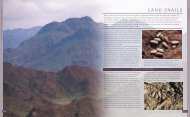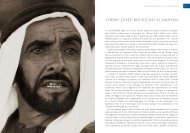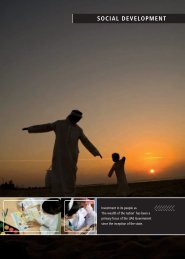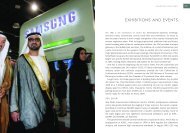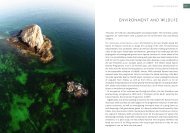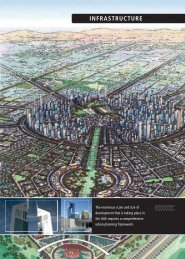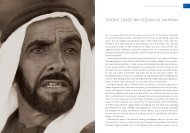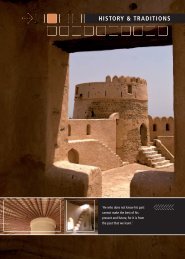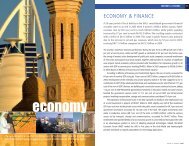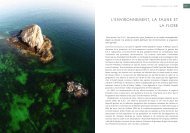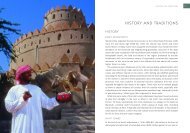Create successful ePaper yourself
Turn your PDF publications into a flip-book with our unique Google optimized e-Paper software.
90UNITED ARAB EMIRATES YEARBOOK 2006<strong>ECONOMIC</strong> <strong>DEVELOPMENT</strong>91followed by banking (86.9 per cent), services (67.5 per cent), insurance (55.3per cent) and the hotels sector (48.2 per cent).In addition to its main trading floor in Abu Dhabi City, Abu Dhabi SecuritiesMarket also operates trading floors in Sharjah and Ra’s al-Khaimah and has plansto open a branch in Fujairah.In June 2005 ADSM launched a short messaging service (SMS) providing investorswith confirmation of their buying and selling orders when they are executed bythe clearing house. The SMS gives details of the number of shares traded and theprices at which the deals are executed.DUBAI FINANCIAL AND INTERNATIONAL FINANCIAL MARKETSThere was a marked increase in trading volume in 2004, with the total valuereaching Dh50.45, compared to Dh3.77 billion at the end of 2003. In terms ofsectoral contribution to trading volume, the services sector ranked first with a ratioof 80.4 per cent of the total by the end of 2004. The banking sector ranked second(13.2 per cent), followed by the investment sector (6.1 per cent) and the insurancesector (0.3 per cent). The local stock market in Dubai (DFM) (www.dfm.ae) had31 companies listed in mid-2005.In June 2005, the Dubai Financial Services Authority (DFSA), the independentregulator of the Dubai International Financial Centre (DIFC), announced three newmodules of rules relating to the functioning of the Dubai International FinancialExchange (DIFX) which was launched in late 2005. The Securities moduleintroduced regulatory rules for the offering of securities in or from the DIFC,and spelled out the regulatory role of DFSA in the listing process. These have beenvital steps towards creating a fully functioning capital market in Dubai, operatingunder world-class regulatory standards.Dubai International Financial Exchange (DIFX), which was officially launched on26 September 2005, is the region’s first cross-border stock exchange. Both regionaland foreign companies are listed. DIFX has set itself the aim of becoming theleading international stock exchange located between Western Europe and EastAsia. Its standards will be comparable with those of leading international stockexchanges in New York, London and Hong Kong. It will deal in equities, bonds,funds, Islamic products, index products and derivatives. DIFX is located in theDubai International Financial Centre (DIFC), a financial free zone which openedfor business in 2004.There are many aspects to the role the Central Bank plays in supporting thenational economy of the United Arab Emirates. In addition to acting as bankerto other banking institutions operating in the country, it is also the banker andfinancial adviser to the government. Central Bank assets grew by Dh13.14billion in 2004, to reach Dh67.64 billion, a 24.1 per cent increase on the assetsheld at the end of 2003. Its profit rose to Dh801.9 million in 2004, comparedto Dh559.2 million in 2003, a 43.4 per cent rise in profit.There were 21 locally-incorporated banks registered in the <strong>UAE</strong> in 2004, whileforeign banks operating in the company had 25 head offices and 87 branches. Inall, there were 50 representative offices of foreign banks at the end of 2004.BANKINGIt is the responsibility of the Central Bank, the country’s regulatory authority, toformulate and implement the <strong>UAE</strong>’s banking, credit and monetary policy in orderto support the <strong>UAE</strong>’s economic policy objectives, including price stability, andto guarantee the value and stability of the <strong>UAE</strong> dirham and its free convertibilityinto all currencies.Banks Operating in the CountryThe aggregated balance sheet of banks operating in the country grew by Dh83.11billion (22.7 per cent) to Dh450.02 billion at the end of 2004, up from Dh366.91billion at the end of 2003. Cash and deposits with the Central Bank increased byDh11.23 billion (41.2 per cent) to Dh38.52 billion at the end of 2004. Net foreignassets of banks reached Dh83.99 billion at the end of 2004, recording an increaseof Dh2.56 billion (3.1 per cent). Credit extended by banks operating in the countryincreased by Dh60.71 billion (26.9 per cent) to Dh286.72 billion, against anincrease by Dh35.12 billion (18.4 per cent) recorded in 2003. Growth in this itemat the end of 2004 had mainly occurred in credit extended to residents, whichrose by Dh50.05 billion (25.4 per cent) to reach Dh246.95 billion. Credit extendedto non-residents also rose by 36.6 per cent to Dh39.77 billion.Increase in credit to residents mainly occurred in loans, advances and overdrafts,which rose by Dh47.63 billion (26.4 per cent). The bulk of this increase went toindustrial and trading enterprises, which accounted for 59.2 per cent of total loans,advances and overdrafts.The increase in receipts at the end of 2004 mainly occurred in residents’deposits, which rose by Dh57.29 billion (25.3 per cent). Non-residents depositsalso increased by Dh2.33 billion (20.8 per cent). Meanwhile, government depositsconstituted 18.3 per cent, and public sector and other deposits constituted 8.2per cent and 4.1 per cent respectively.Excluding government deposits and commercial prepayments, total depositsclassified according to type reflected an increase in current deposits by Dh25.57billion (44.2 per cent). Deposits in local currency increased by Dh30.75 billion(22.8 per cent), while deposits in foreign currency rose by Dh16.04 billion (27.3per cent).An analysis of banks’ capital position at the end of 2004 shows that the total ofcapital and reserves accounts reached Dh52.46 billion, an increase of Dh8.01 billion(18 per cent) compared to the end of 2003.



